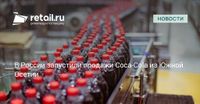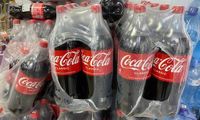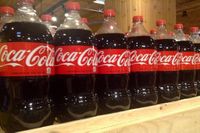In a surprising turn of events, Russian retailers are now receiving offers to supply drinks under the Coca-Cola brand, nearly three years after the American company suspended its operations in the country. This new development has stirred significant discussions about legality and market ramifications, particularly since the Coca-Cola brand is now being produced by a company registered in South Ossetia, in partnership with the Novosibirsk company, PKV.
After The Coca-Cola Company halted its Russian operations in early 2022, Coca-Cola HBC, which handles the company's bottling and distribution in many regions, shifted its focus entirely toward local brands. However, the landscape has changed, with reports emerging that the newly registered Coca-Cola Companies LLC, based in South Ossetia, has made arrangements to bring this iconic beverage back under a guise that closely resembles the original product.
The upcoming drink's label, sources indicate, is nearly identical to that of the original Coca-Cola, leading to questions about the brand's authenticity and the potential for trademark violations. According to a presentation for the retail chains, the product is marketed as legally compliant, which could make it attractive to some consumers eager to reconnect with a familiar taste.
"The product produced by PKV claims to be legally compliant," reported Kommersant, indicating that preparations are being made to ensure the drink's market entry adheres to relevant regulations. However, as analysts from Infoline-Analytics have pointed out, major retail chains may hesitate to pursue this unofficial Coca-Cola, given the associated financial and reputational risks. These concerns primarily stem from the idea that the trademark rights currently held by the original Coca-Cola Company remain in effect, and using these marks without consent could lead to significant legal repercussions.
The issue raises broader questions about intellectual property rights and consumer behavior in a market where authenticity is increasingly scrutinized. Eldar Guliyev, a lawyer specializing in intellectual property at the KIAП law firm, articulated the legal complexities of the situation. "The use of trademarks without the company's consent is likely to be a violation," he noted, emphasizing the potential for court disputes if Coca-Cola’s owners decide to take action against unauthorized usage.
This is not just a matter of legal compliance; it adds a new layer to the competitive beverages market in Russia. Since Coca-Cola's withdrawal, other carbonated beverages such as domestic brands and international alternatives have gained ground. The new product from PKV could potentially carve out a niche in smaller, non-chain stores, where the allure of a familiar brand name might help it gain traction despite the surrounding risks.
An intriguing aspect of this endeavor is the proposed price point of 89 rubles per liter for self-delivery from Novosibirsk. This pricing strategy positions PKV's beverage as a more affordable alternative compared to established brands, which aligns with consumers seeking affordable indulgences amidst economic uncertainties.
As of late 2024, PKV has reportedly obtained several declarations of conformity for its carbonated drinks labeled Coca-Cola, indicating that preparations for market entry are progressing. Nonetheless, experts suggest that consumer reception will depend significantly on the perceived legitimacy and quality of the product.
In summary, the dynamics of the soft drink market in Russia are evolving as new players attempt to leverage familiar brands in creative ways. With Coca-Cola's enduring legacy still potent in the minds and palettes of consumers, the interactions between legality, brand loyalty, and market strategy are likely to dominate discussions in the coming months. Whether this new Coca-Cola alternative will establish itself successfully among consumers remains to be seen, but one thing is clear: the nostalgia and familiarity associated with the Coca-Cola name hold powerful sway in the beverage landscape.









